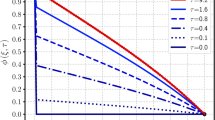Abstract
This article presents an analytical approach for identification problems related to ion transport problems. In the first part of the study, relationship between the flux \({\varphi_L := (D(x)u_x(0, t)_{x=0}}\) and the current response \({{\mathcal I}(t)}\) is analyzed for various models. It is shown that in pure diffusive linear model case the flux is proportional to the classical Cottrelian \({{\mathcal I}_C(t)}\). Similar relationship is derived in the case of nonlinear model including diffusion and migration. These results suggest acceptability of the flux data as a measured output data in ion transport problems, instead of nonlocal additional condition in the form an integral of concentration function. In pure diffusive and diffusive-convective linear models cases, explicit analytical formulas between inputs (diffusion or/and convection coefficients) and output (measured flux data) are derived. The proposed analytical approach permits one to determine the unknown diffusion coefficient from a single flux data given at a fixed time t 1 > 0, and unknown convection coefficient from a single flux data given at a fixed time t 2 > t 1 > 0. Linearized model of the nonlinear ion transport problem with variable diffusion and convection coefficients is analyzed. It is shown that the measured output (flux) data can not be given arbitrarily.
Similar content being viewed by others
References
Ciszkowska M., Stojek Z.: J. Electroanal. Chem. 466, 129 (1999)
Kucza W., Danielewski M., Lewenstam A.: Electrochem. Commun. 8, 416 (2002)
Lange R., Doblhofer K.: J. Electroanal. Chem. 237, 13 (1987)
K. Pfabe, A problem in nonlinear ion transport, PhD Thesis, University of Nebraska, Lincoln, 1995
Cohn S., Pfabe K., Redepenning J.: Math. Models Methods Appl. Sci. 9, 455 (1999)
Bieniasz L.K.: Electrochem. Commun. 4, 917 (2002)
Jammik J., Maier J., Pejovnik S.: Electrochem. Acta 44, 4139 (1999)
Cohen H., Cooley I.W.: Biophys. J. 4, 145 (1965)
Hasanov A., Hasanoglu Ş.: Math. Chem. 44, 133 (2008)
Hasanov A., Hasanoglu Ş.: Math. Chem. 44, 731 (2008)
A. Hasanov, Ş. Hasanoglu, B. Pektaş, Math. Chem. (2009) (to appear)
Cottrell F.G.: Z. Phys. Chem. 42, 385 (1903)
Hasanov A., Hasanoglu Ş.: Math. Chem. 42, 741 (2007)
Koryta J., Dvořák J., Kavan L.: Principles of Electrochemistry, 2nd edn. Wiley, New York (1993)
Chancelier J.P., Cohende Lara M., Pacard F.: Math. Models Methods Appl. Sci. 5(3), 267 (1995)
Lenhart S.: Math. Models Methods Appl. Sci. 5(2), 225 (1995)
Author information
Authors and Affiliations
Corresponding author
Rights and permissions
About this article
Cite this article
Hasanov, A. Identification of unknown diffusion and convection coefficients in ion transport problems from flux data: an analytical approach. J Math Chem 48, 413–423 (2010). https://doi.org/10.1007/s10910-010-9683-5
Received:
Accepted:
Published:
Issue Date:
DOI: https://doi.org/10.1007/s10910-010-9683-5




